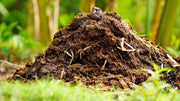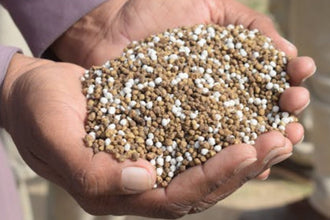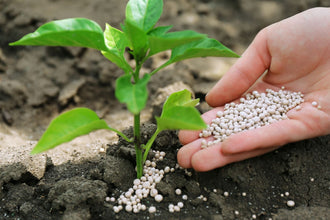
Choosing between chicken manure vs. blood meal can totally change how your garden grows this year. Both of these organic fertilizers are packed with nitrogen, but they work in really different ways. Your plants absolutely need nitrogen to grow strong and stay green, but using the wrong one could leave your garden looking sad or even damage your plants.
Most people just grab whatever fertilizer catches their eye at the store without really knowing how each one actually works. This usually leads to disappointing results and money down the drain. Smart gardeners know that when you understand your nitrogen sources, you get better plants, healthier soil, and way bigger harvests.
Understanding Nitrogen Sources for Your Garden
Plants eat up nitrogen faster than pretty much any other nutrient out there. This stuff is what makes leaves grow, stems get strong, and gives you that gorgeous deep green color every gardener dreams about. When plants don't get enough nitrogen, they stay tiny, turn yellow, and give you pathetic harvests.
Organic nitrogen sources work totally different from those synthetic fertilizers you see everywhere. They release nutrients slowly while soil bugs break them down. This takes some time, but it creates benefits that stick around for your soil and plants.
Blood meal comes from dried animal blood, mostly from places that process cattle. Companies heat it up and dry it out, then grind it into this dark powder. This whole process makes a super concentrated nitrogen source with about 12-15% nitrogen.
Chicken manure starts as fresh poop from chicken farms. Farmers let it age and compost to make it safe for gardens. The final product has around 4% nitrogen plus phosphorus, potassium, and organic matter mixed in.
The Blood Meal Advantage: Fast-Acting Nitrogen Power
Blood meal gives plants nitrogen faster than almost any other organic fertilizer out there. Plants can actually use this nitrogen within just a few days after you put it down. Gardeners love blood meal because it makes things green up fast and plants respond super quickly.
How Blood Meal Works in Your Soil
Soil bacteria break down the proteins in blood meal and turn them into nitrogen that plants can actually use. This happens really fast when it's warm and moist outside. Plants suck up that released nitrogen through their roots almost right away.
Since blood meal has so much nitrogen packed in, you don't need to use as much per application. A little bit covers way more garden space than those bulky organic fertilizers. This makes blood meal pretty cost-effective when you need spot treatments or emergency plant feeding.
Best Uses for Blood Meal
Vegetable gardens get the most benefit from blood meal applications. Leafy stuff like lettuce, spinach, and kale go crazy when you feed them blood meal. Corn, tomatoes, and peppers also perk up really fast with blood meal supplements.
Spring applications work really well with blood meal. Put it down before you plant or when you're moving seedlings around. That quick nitrogen hit gives young plants exactly what they need for strong early growth.
Container gardening is perfect for blood meal use. Plants in pots need concentrated nutrition since they don't have much soil space. Blood meal gives you maximum nitrogen impact without eating up container room.
Chicken Manure Benefits: Building Long-Term Soil Health
When you compare chicken manure vs. blood meal, chicken manure definitely wins for making your soil better overall. This organic stuff feeds plants while it builds up soil structure and keeps beneficial microorganisms happy.
The Complete Nutrition Package
Fresh chicken manure has nitrogen, phosphorus, and potassium all balanced out nicely. The typical breakdown shows 4-2.5-2, which gives plants broad nutrition way beyond just nitrogen. This complete feeding supports everything your plants need to grow.

Organic matter makes up a huge chunk of aged chicken manure. This organic stuff makes soil structure better, helps it hold water, and improves drainage all at the same time. Your soil gets easier to work with and becomes way more resilient over time.
Slow-Release Feeding System
Chicken manure lets nutrients out gradually as tiny organisms break down the organic material. This slow-release pattern feeds plants steadily for months after you put it down. Plants get consistent nutrition instead of that crazy feast-or-famine thing you get with quick-release fertilizers.
Soil biology absolutely loves regular chicken manure applications. Good bacteria and fungi multiply like crazy in environments rich with organic stuff. These microorganisms help plants get nutrients and fight off disease problems.
Long-Term Soil Building
Using chicken manure regularly totally transforms your soil structure over a few seasons. Clay soils get more workable and drain better. Sandy soils hold onto moisture and nutrients way more effectively. This soil improvement keeps going for years even after you stop using chicken manure.
Application Methods and Timing Differences
Blood meal needs careful application so you don't damage your plants. All that concentrated nitrogen can burn plant roots if you use too much or put it too close to stems. Always mix blood meal into soil instead of just leaving it sitting on top.
Spring applications work best for blood meal. Put it down 2-3 weeks before planting or when plants show they need nitrogen. Don't use it during hot summer weather when burn risk goes way up.
Chicken manure gives you way more flexibility with timing and how you apply it. You can use it in fall, winter, or spring without worrying about burning anything. Work it into planting beds or use it as mulch around plants that are already established.
Safe Application Rates
Blood meal applications should never go over 1-2 pounds per 100 square feet of garden space. Start with smaller amounts and slowly increase based on how your plants respond. Too much blood meal makes excessive leaf growth instead of good fruit production.
You can apply chicken manure way more generously without worrying about burns. Use 2-4 inches of composted chicken manure as soil amendment or mulch. The organic matter helps your soil no matter what the nutrient content is.
Cost and Availability Factors
Blood meal costs more per pound than chicken manure, but it gives you concentrated nutrition. Small gardens might find blood meal more economical because you use less. Large gardens usually do better with cheaper bulk chicken manure purchases.
Local availability really affects cost. Areas near chicken farms often have cheap chicken manure sources. City gardeners might find blood meal easier to get at garden centers.
Storage needs are different for these nitrogen sources. Blood meal stores easily in small containers and stays good for years. Chicken manure needs more storage space but you can pile it up outdoors without it going bad.
Environmental Impact Considerations
The environmental impacts of chicken manure vs. blood meal are pretty different. Chicken manure is basically recycling farm waste, keeping organic matter out of waste streams. This recycling cuts down on environmental pollution from big animal operations.
Blood meal production needs extra processing energy to dry and grind animal blood. But it also prevents waste from meat processing places. Both products support sustainable farming by recycling byproducts from animal agriculture.
Water quality problems can happen with both fertilizers if you use too much. Extra nitrogen from either source can leak into groundwater or wash off into surface water. Using responsible application rates prevents environmental contamination.
Soil health gets better with chicken manure because of all the organic matter it adds. Healthier soils capture and store carbon while supporting more biodiversity. This soil improvement gives long-term environmental benefits beyond just plant nutrition.
Making the Right Choice for Your Garden
Small gardens with specific nitrogen needs often do better with blood meal applications. The concentrated nutrition and precise application make blood meal perfect for targeted plant feeding. Container gardens and raised beds work really well with blood meal supplements.
Large gardens and long-term soil building projects work better with chicken manure applications. The organic matter and slow-release nutrition support overall garden health. Established gardens benefit from yearly chicken manure applications to keep soil fertility up.
Climate stuff affects your choice between these organic fertilizers. Hot climates make blood meal applications risky during summer months. Chicken manure works safely in all weather when it's properly composted.
Budget-conscious gardeners usually prefer chicken manure because it costs less per application. The soil building benefits give long-term value beyond just immediate plant nutrition. Blood meal works better for emergency plant feeding when quick results matter more than cost.
Your soil type affects which nitrogen source works better too. Heavy clay soils need organic matter more than concentrated nutrients. Sandy soils benefit from both organic matter and slow-release nutrition that chicken manure gives.
Combining Both for Maximum Results
Smart gardeners often use chicken manure vs. blood meal together instead of picking just one. Apply chicken manure every year for soil building and basic nutrition. Use blood meal for quick plant response when you need it.
Spring soil prep works great with chicken manure applications. Work aged manure into planting beds 2-4 weeks before planting. This gives organic matter time to mix with your existing soil.
Growing season applications of blood meal handle specific plant needs. Use blood meal when plants show nitrogen deficiency or need quick green-up. This targeted approach gets maximum benefits from both organic fertilizers.
The combination approach gives both immediate and long-term benefits. Plants get quick nutrition from blood meal while soil health improves from chicken manure organic matter. This balanced feeding system supports sustainable gardening practices.
Your garden will do amazing when you match fertilizer choice to your specific needs and conditions. Understanding how chicken manure vs. blood meal work differently helps you make way better decisions. Both organic nitrogen sources have their place in successful organic gardening systems.
Fancy Chicken Organic Fertilizer: The Best of Both Worlds
Premium Pelletized Convenience Meets Superior Results
Fancy Chicken organic fertilizer bridges the gap between chicken manure vs. blood meal by offering the soil-building benefits of traditional manure in an easy-to-use pelletized form. This premium organic fertilizer delivers a balanced 4-2.5-2 NPK ratio that feeds plants while transforming soil health over time.
The pelletized format eliminates the mess and odor issues that come with fresh or composted chicken manure. You get all the organic matter and slow-release nutrition without dealing with bulk applications or storage headaches. Each pellet breaks down gradually, releasing nutrients as plants need them most.
Why Fancy Chicken Outperforms Regular Chicken Manure
Fancy Chicken's manufacturing process creates several advantages over traditional chicken manure applications:
-
Concentrated nutrition - More nutrients per pound than raw manure
-
No weed seeds - Heat processing eliminates unwanted plant growth
-
Pathogen-free - Safe handling without disease transmission risks
-
Consistent quality - Every bag delivers the same nutrient profile
-
Extended shelf life - Stores easily without composting requirements
-
Precise application - Measured feeding instead of guessing amounts
The pellets also provide better nutrient distribution across your garden space. Raw chicken manure often creates hot spots where nutrients concentrate, leading to uneven plant growth. Fancy Chicken pellets spread evenly and break down uniformly for consistent feeding.
Application Advantages Over Blood Meal
While blood meal works fast, Fancy Chicken provides sustained nutrition that lasts months longer. Plants fed with Fancy Chicken develop stronger root systems and better disease resistance compared to the quick nitrogen rush from blood meal applications.
The organic matter in Fancy Chicken feeds beneficial soil organisms that blood meal simply cannot support. This creates a living soil ecosystem that continues working long after application. Your soil structure improves with every use, making future gardening easier and more productive.
Fancy Chicken also eliminates the burning risks associated with blood meal. The slow-release formula prevents root damage while delivering steady nutrition throughout the growing season. You can apply it safely around established plants without worrying about concentration issues.
Perfect for Modern Gardening Needs
Today's gardeners want effective nutrition without complicated application procedures. Fancy Chicken delivers professional results with simple spreading techniques. Use it for vegetables, flowers, lawns, or container plants with the same excellent outcomes.
The pelletized format makes storage and handling much easier than bulk manure products. A single bag covers significant garden area while taking up minimal storage space. This convenience factor makes consistent soil building realistic for busy gardeners who want great results without major time investments.
Fancy Chicken works especially well for gardeners transitioning from synthetic fertilizers. The balanced nutrition helps restore soil biology while providing the feeding consistency plants need during the adjustment period.
Choose Your Garden's Success Story Today
Your garden deserves nutrition that works as hard as you do. Whether you choose the quick response of blood meal, the soil-building power of traditional chicken manure, or the premium convenience of Fancy Chicken organic fertilizer, success comes from matching your fertilizer to your garden's specific needs.
Stop guessing about plant nutrition and start building the thriving garden you've always wanted. Your plants are waiting for the right feeding program, and your soil is ready to become more productive than ever. The perfect growing season starts with making informed choices about organic fertilizers that actually deliver results.








